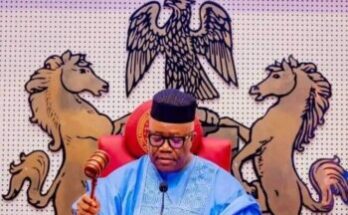President Muhammadu Buhari, this week in Abuja, called on member states of the African Union (AU) to imbibe the culture of peer review and peer-to-peer learning for Africa’s development.
The President said self-assessment for good governance in the continent is essential to guarantee good leadership.
A specialised agency of the African Union (AU), the African Peer Review Mechanism (APRM), was initiated in 2002 and established in 2003 by the African Union in the framework of the implementation of the New Partnership for Africa’s Development (NEPAD).
APRM is a tool for sharing experiences, reinforcing best practices, identifying deficiencies and assessing capacity-building needs to foster policies, standards and practices that lead to political stability, high economic growth, sustainable development and accelerated sub-regional and continental economic integration.
Member countries within the APRM undertake self-monitoring in all aspects of their governance and socio-economic development. African Union (AU) stakeholders participate in the self-assessment of all branches of government – executive, legislative and judicial – as well as the private sector, civil society and the media.
The APRM Review Process gives member states a space for a national dialogue on governance and socio-economic indicators and an opportunity to build consensus on the way forward.
The President made his appeal at the launch of the Second Country Review Report (CRR) and the National Programme of Action (NPoA) of Nigeria.
He expressed delight that electoral, pension, tax and monetary policy reforms undertaken by his administration have received high commendations from African policy experts, who have also recommended that such best practices are worthy of emulation.
He explained that his commitment to the Second Review of Nigeria was borne out of his ‘‘undiluted resolve to entrench democracy and quality leadership, in all aspects of governance, and further ensure that Nigeria does not lag behind other nations.’’
Of course, as the President said, it is improper for any nation, including Nigeria, to lag in any area. Peer-reviewed countries are expected to implement the APRM’s recommendations.
Agreed, countries can’t implement some recommendations, which may involve expenditures, not in the budget and technical experts are not readily available in many countries.
Regrettably, countries are not bound to implement APRM recommendations, no matter how good as they may even reject some of them as inappropriate.
However, the APRM has been an eye-opener for African leaders in its role as an early warning system. In 2007, its reports warned the continent’s leaders about brewing violence from xenophobia in South Africa and post-election fallout in Kenya. It was very clear in 2007 that something was going to happen if no strong measures were taken to avert the crises but the governments did not take the recommendations seriously.
The loss of lives and property in both countries was a wake-up call for African leaders, who later requested a follow-up special investigation on Kenya.
Although African leaders would like to have the APRM insulated against foreign influence, they also realise that the body needs resources, some of which could come from outside Africa. Still, African countries should be encouraged to build capacities while they call for the support of the UN and the global community in financial and capacity building.
However, they say charity must begin at home – African nations should offer support to one another. For example, Nigeria has abundant skilled persons in engineering and medicine and it can lend a hand to other countries.
In this vein, African countries should also domesticate good practices in their affairs. As the President pointed out, it is important to Nigeria as a country built on true federalism and good governance, to instruct Ministries, Departments and Agencies to implement good practices.
Doing so, no doubt would strengthen the implementation of the African Union Agenda 2063, the strategic framework for the socio-economic transformation of the continent over the next 50 years.
Thankfully, the President pledged that Nigeria would continue to support Africa’s renewal and rebirth in line with the collective commitment to the principles and guidelines of the APRM to consolidate Africa’s path to a healthy democracy, sustainable growth and development.
Thankfully, too, the President has recognised the pragmatic role of the Panel of Eminent Persons of the African Peer Review Mechanism led by Dr Abdoulie Janneh, who doubles as the Nigerian lead panellist, and the entire team members saying: “I am very much aware of the five pillars of APRM: Democracy and Political Governance, Economic Governance, Socio-Economic Governance, Corporate Governance and Cross-Cutting Issues which are the nucleus of good governance and upon which the Second Review was conducted.”
Welcome onboard Joe Ajaero
President Muhammadu Buhari has congratulated Joe Ajaero on his emergence as the new president of the Nigeria Labour Congress (NLC).
The President also hailed the National Executive Committee of the NLC on the success of the congress that produced the new leadership.
The Nigeria Labour Congress (NLC) on Wednesday swore in new executives, with Joe Ajaero as the new president to lead the workers for the next four years.
Ajaero, a former General Secretary of the National Union of Electricity Workers, was voted on consensus at the 13th NLC’s National Delegates Conference in Abuja.
Ajaero took over the NLC leadership from Ayuba Wabba, who served between 2015 and 2023.
In his acceptance speech, the new NLC President said that the executives were committed to pursuing the interest and desires of the workers and entire Nigerians.
He promised that his leadership would speak for millions of Nigerians and seek a platform to lift them out of poverty.
However, while it is a fact that plenty of Nigerians are socially and economically poverty-stricken, the NLC seems to face its type of poverty in the areas of vibrancy and intellectual capacity.
The NLC has progressively degenerated. It used to have a developmental labour movement in NLC that engaged the government not only through strikes but intellectually.
The NLC, then, responded to changes in the global economy by producing position policy papers outlining how reforms could take place with minimised hardship to workers and the poor masses.
The NLC used to develop sound intellectual and policy papers that forced the government to respond to the situation and, during this period, the unions, under the leadership of the NLC, could put alternative policy and development agendas on the table.
On the strengths of its alternative development framework, the NLC went into negotiations with the governments on how to ensure reforms aimed at the development of the country, and one that will be beneficial to not only workers but the majority of the Nigerian people.
Because of this capacity, the NLC extracted concessions that were beneficial to its members and the average Nigerian. This was how the NLC managed itself and made its programmes accepted by Nigerians.
However, lately, the congress leadership, with its pseudo-progressive stance, turned the NLC into an organisation not of workers, but of labour leaders. Ordinary workers are unhappy about what their federation had turned to.
Therefore, when Ajaero said that “we, therefore, pledge our loyalty to the NLC, workers, the Nigerian people and the country…our thoughts and actions shall be propelled by this avowal,” Nigerians hope that his words carry the weight of their meanings.
Of course, going by his antecedent, Nigerians love to take Ajaero seriously. President Buhari said: “After many years of hard work and struggles, the selflessness with which Ajaero dedicated himself today paid off. His journey in the labour movement has been a remarkable one, marked by many important milestones.”
Aligning themselves with President Buhari’s wishes, Nigerians hope, too, that as Ajaero “rises to the highest position in the NLC, it is our hope and desire that he will use the position to write a new chapter of progress for all workers and the labour movement in the country and the continent in general.”




